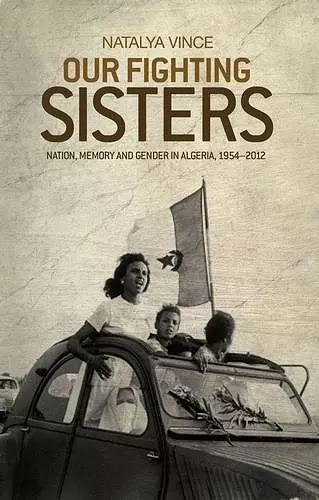Our Fighting Sisters
Nation, Memory and Gender in Algeria, 1954–2012
Format:Paperback
Publisher:Manchester University Press
Published:24th Aug '16
Should be back in stock very soon

Winner of the 2016 Women's History Network Book Prize
Between 1954 and 1962, Algerian women played a major role in the struggle to end French rule in one of the twentieth century's most violent wars of decolonisation. This is the first in-depth exploration of what happened to these women after independence in 1962. Based on new oral history interviews with women who participated in the war in a wide range of roles, from urban bombers to members of the rural guerrilla support network, it explores how female veterans viewed the post-independence state and its multiple discourses on 'the Algerian woman' in the fifty years following 1962. It also examines how these former combatants' memories of the anti-colonial conflict intertwine with, contradict or coexist alongside the state-sponsored narrative of the war constructed after independence. Making an original contribution to debates about gender, nationalism and memory, this book will appeal to students and scholars of history and politics.
‘Memories of wars matter. In their intimate and collective forms, wartime memories can shape current post-war identities, loyalties, understandings, aspirations, fears and, of course, silences…one of the most notable decisions that Natalya Vince has made in writing Our Fighting Sisters is choosing the dates for her subtitle: ‘1954–2012.’ By choosing 2012 as her end point, she immediately highlights the analytical time frame of her investigation. She tells us that she does not think the Algerian anti-colonial war simply ended when the French pulled out. Rather, she contends, the war’s gendered ripple effects have extended into ‘peacetime.’
Cynthia Enloe, Clark University, Worcester, MA, USA, Women's History Review
‘For me, this is the most accomplished published work in recent years. Based on a thorough reading of the existing literature, an intimate knowledge of the field of research and in-depth interviews, the work of this young researcher is remarkable by the insightfulness of its observations and the pertinence of its conclusions…a landmark in the writing of the history of the Algerian women’s movement.’
Khaoula Taleb Ibrahimi, University of Algiers 2 – Algeria, Women's History Review
‘Our Fighting Sisters: nation, memory and gender in Algeria, 1954–2012 by Natalya Vince definitely meets the expectations that the title anticipates: this well organized and clearly written book is rich in its elaboration of the topics of nation, memory and gender. It is based on a deep historical analysis of the role of women during the Algerian War of Independence and afterwards. With her book, Vince opens up a debate on the role of women in the war that continues to be dominated by the official post-colonial and nationalist state discourse in Algeria.’
Nadine Siegert, Iwalewahaus, University of Bayreuth – Germany, Women's History Review
‘Scholars from multiple disciplines will therefore find much of interest and value in this excellent study of memory and gender in Algeria.’
Claire Eldridge, University of Leeds, Journal of Contemporary History 52(2)
'It is hard to underestimate either the value of this resource or the originality of the insights derived from it...Specialists in women's history and historical memory will find rich pickings throughout, and perhaps most of all in a searing final chapter, "Being remembered and forgotten" in which the post-colonial disappointments of nationalist activism and modernist idealism are laid bare.'
Martin C. Thomas, University of Exeter, H-Diplo May 2016
'...sophisticated and thought-provoking study...'
Allison Drew, University of York, Labour History Review, vol. 81, no. 1
'...a fascinating, worthwhile book on female war veterans' memory of their role in the war...'
Katharina Marlenehey, LMU Munich/ENS Paris, French History, (2016)
‘Our Fighting Sisters is an extremely rich and well-documented monograph.’
Emmanuel Pierre Guittet, Explosive Politics
‘This book is one of the first to take an interest in the place of women in discussions of the Algerian nation from the War [of Independence] to the 2000s. It is very exciting in a number of ways.’
Raphaëlle Branche, Vingtième Siècle: Revue d'histoire
‘Natalya Vince’s book on women’s contribution to the Algerian War of Independence, and on the legacy of their struggle until 2012, offers a ground-breaking view of the history of postcolonial Algeria. The fruit of years of research using archives in Algeria and, most import-antly, interviews with women remembering the war and commenting on their position and role in its aftermath, the book covers unprecedented terrain in its revelation of a little-charted history.’
Jane Hiddleston, Exeter College, University of Oxford, Bulletin of Francophone Postcolonial Studies
‘Along with compelling anecdotes and contextualization, Vince’s wit keeps her readers engaged, resulting in a work that is not only highly informative for a number of fields but also engrossing. […] Vince’s writing is clear and accessible to a general public. Our Fighting Sisters will appeal to both scholars and students at the undergraduate and postgraduate levels interested in discovering more about the legacy and lives of Algerian women and the mujahidat as well as social memory formation in post-conflict, postcolonial, and highly politicized contexts. Vince also masters the delicate task of providing enough of a contextual framework for deciphering her narrators’ testimonies and the conditions in which the women produce while also permitting space for the mujahidat to speak for themselves. The result is a work that highlights the difficult and different circumstances before, during, and after the conflict for the mujahidat while also helping to map out for readers the jagged terrain that is social memory formation and circulation in many Algerian communities.’
Elizabeth Perego, Shepherd University, H-France Review Vol. 18 (December 2018), No. 236
- Winner of winner of the Women's History Network Book Prize 2016 (UK)
ISBN: 9781526106575
Dimensions: 216mm x 138mm x 16mm
Weight: 349g
296 pages